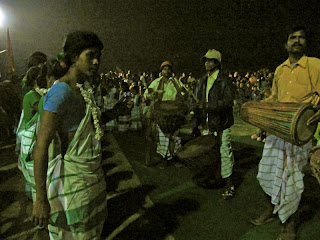"This parting thought" is more difficult to express in words than I imagined. Even as this project comes to its end, I consider it just as a beginning. There are flashes of images that comes and goes...and it doesn't make it easier for me to write something in the end. But its important to put my last thoughts about the project in this post... for I know and wish to tell others that the "tales from the river" have not come to an end. I have come to look very closely how much the contribution of the indigenous people of Jamshedpur has made in shaping the history and identity of the township, and have learnt to appreciate it as never before.
In these past few months, I have been able to explore remote areas, sometimes on my own and sometimes in the company of others who have made it their mission to venture into remote areas to bring forth a change for the better. Looking at them,I have seen, and learnt a few things - about survival. Even as I sit writing this, and grumble about the heat from time to time, I remember the children out there in the scorching heat, with some not having even a proper roof over their heads. Talking of childhood - girls in their teens carry their brood around as they work…
But something is definitely about to change.
Until recently, these families lived the lives of a nomads. Birsa Munda Awas Yojna and Indira Awas Yojna schemes for primitive tribes means some shelter for many such families. This in itself is a remarkable change. Providing free medication, creating job opportunities in weaving and farming , reviving and preserving the cultural heritage - languages… musical instruments… sport… craft practices are some of the activities the various NGOS's are working towards in this region. Now some of the families send their children to schools. Deserving students are given scholarships to pursue higher studies.
In these months I have come to appreciate the life of the people not only at Doumahani, but in all the distant places that I visited. Though progress is gradual, it will be seen sooner or later. Doumahani, - the space is changing… there are talks of a bridge to be built across the river, there is some delay but the proposal has been sanctioned - and I can feel the change that will soon follow. Change is imminent; but whatever turn it takes, I hope Doumahani will be - where the rivers meet its people.
To memory and the hope of a new one...!!!



















































